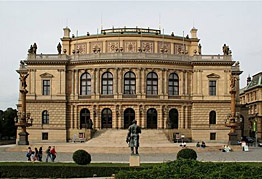
The construction of the concert hall in Prague is to be supported by an association and a memorandum
 |
Both musicians and politicians agree that Prague is lacking a concert hall. Various initiatives have been striving for its construction for several decades. However, the metropolis still lacks a suitable site; in the past, there were discussions about Štvanice, for example. The city's development department is also reportedly dealing with the search for a location.
This problem is to be addressed by a civil association called the Association for the Construction of a New Concert Hall in Prague, whose chairman is Roman Bělor, the director of the Prague Spring festival. The association is also negotiating a joint memorandum with the capital city. The city council will discuss the memorandum this Tuesday.
A new concert hall could have been built in the capital as early as the mid-1990s, when Japanese investors wanted to donate it to the Czech Philharmonic for its centenary. The project was prepared, but the then Minister of Culture Milan Uhde and Mayor Milan Kondr ultimately rejected the plan. The initiative was backed by President Václav Havel and Japanese Emperor Akihito. The hall was to be located in Letná near Špejchar, on the same site as the unrealized National Library project by architect Jan Kaplický.
Prague audiences, primarily seeking classical music, still frequent the former House of Artists. Today's Rudolfinum was opened 125 years ago (February 7, 1885), and its main concert hall, Dvořák Hall, accommodates approximately 1023 listeners. The hall has very good acoustics; however, with a large orchestral ensemble, it reaches an unacceptable volume. Problems also arise during amplified concerts. The seating does not provide sufficient legroom, and the hallways tend to be overcrowded during intermissions.
The last concert hall for classical music built in the Czech capital was Smetana Hall in the Municipal House in 1912. Its capacity is similar to that of the Rudolfinum. In addition to poor visibility from the back rows, it is not possible to hold amplified performances here.
The last larger hall suitable for classical concerts is the Prague Congress Centre. However, many Prague residents still have prejudices against the 1980s building, and experts criticize its largest hall for variable acoustics. Additionally, the centre is struggling with repayment issues related to a debt of about two billion.
The English translation is powered by AI tool. Switch to Czech to view the original text source.
7 comments
add comment
Subject
Author
Date
Kdepak...
Thomas
27.04.10 12:08
....
ondrejcisler
27.04.10 01:33
Kde
Vích
27.04.10 04:47
...Chi, chi, chi, chi...
šakal
27.04.10 06:37
ad vich
misko
27.04.10 07:06
show all comments









